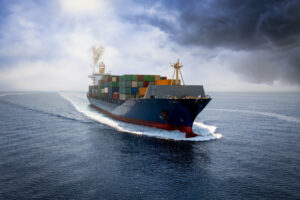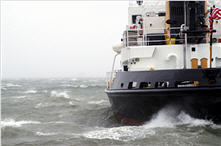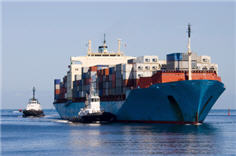Admiralty and Maritime Law Center
 Admiralty and maritime law governs disputes that arise on vessels operating on the ocean and some other bodies of water. Common suits brought under admiralty law include damaged cargo, injured seamen, collisions between vessels, and maritime pollution.
Admiralty and maritime law governs disputes that arise on vessels operating on the ocean and some other bodies of water. Common suits brought under admiralty law include damaged cargo, injured seamen, collisions between vessels, and maritime pollution.
GetLegal’s Admiralty and Maritime Law Center provides general legal information on select admiralty laws.
How Justice Is Administered in Matters involving Bodies of Water
One of the key components of any legal dispute is the determination of jurisdiction, i.e., which court has the authority to hear and resolve the case. One of the principal ways of establishing jurisdiction is based on the physical location of some important aspect of the dispute, e.g., where an injury occurred, where a contract was signed, or where business was conducted. When the issues relating to a legal dispute arise on a ship in the ocean, or on a lake or river, that determination can be more challenging. In response, a vast body of law, known as admiralty or maritime law, has developed. This area of law governs a broad range of matters related to navigable waters in and connected with the United States.
History of Admiralty and Maritime Law
As shipping was one of the earliest forms of intra-country commerce, it should come as no surprise that admiralty and maritime laws have been around for thousands of years. Both Byzantine and Roman legal codes contained laws governing trade on the high seas. In England, the first admiralty laws were enacted by Queen Eleanor of Aquitaine.
The development of admiralty laws in the United States predates the American Revolution. In fact, the colonists’ aversion to enforcement of the Stamp Act, one of the key factors leading to the revolt, stemmed from the English practice of giving English admiralty courts, where there was no right to trial by jury, jurisdiction over the colonists. Many of the founding fathers, including Alexander Hamilton and John Adams, were admiralty attorneys, and admiralty law has been an important component of American law for the life of the nation.
The Administration of Admiralty and Maritime Law
As set forth in the U.S. Constitution, federal courts have original jurisdiction over all maritime and admiralty matters; therefore, as a general rule, such matters must be filed and resolved in the federal courts. However, the Judiciary Act of 1789 contains a provision, known as the “saving to suitors” clause, which allows many claims to be heard in either a state or federal court.
Certain claims may only be brought in federal court, such as salvage cases, property seizures, vessel arrests, and attempts to limit a shipowner’s liability. Federal admiralty courts are specialty courts with jurisdiction and knowledge of the rules and laws that govern issues related to watercraft, waterways, and incidents on bodies of water.
The following types of maritime claims may be brought in either state or federal court:
- Minor personal injury actions involving workers or passengers
- Cargo or other property damage claims
- Maritime product liability claims
- Collisions and recreational boating accidents
The United States Coast Guard is the federal agency with responsibility for enforcing all laws on navigable bodies of water in or contiguous with the United States.
Maritime Worker Injuries
Maritime workers who are hurt on the job may have a claim for damages under the common law or federal statutory law.
Under the common law (the law found in judicial opinions), seamen who are injured on the job have a right to pursue compensation for “maintenance and cure.” Maintenance compensates the seaman for daily living expenses while convalescing, whereas cure pays the costs of medical care required as a consequence of the injury.
Among the federal statutes that provide relief are:
- The Jones Act—This law allows a maritime worker to recover compensation when they sustain an injury caused by the negligence of an employer. The worker need only show that the employer contributed in some way (regardless how small) to causing the accident. Common Jones Act claims include slip-and-falls on wet or oily surfaces, assaults by coworkers, failure to maintain equipment, and injuries caused by fatigue from being overworked.
- The Longshore and Harbor Workers’ Compensation Act (LHWCA)—The LHWCA is essentially the workers’ compensation program for maritime workers, covering anyone employed in maritime operations, including ship mechanics, longshoremen, and harbor workers. It does not provide coverage for employees who qualify for benefits under other state or federal workers’ compensation laws.
- The Death on the High Seas Act (DOHSA)—This law provides compensation for the surviving family members of any maritime worker who dies in an accident that occurs at least three miles from shore.
Injuries to Passengers
Passengers on any watercraft who suffer injuries while on board may bring a personal injury lawsuit for damages or losses, typically based on a legal theory of negligence. That lawsuit may be filed against the ship owner or any other party whose actions constituted a breach of the duty of care and caused the accident and injury. Persons injured on a cruise ship, though, may be limited by restrictions printed on their ticket or contained in some other contract for the cruise.
Summary
The laws of admiralty govern most legal issues that arise on the navigable waters within and contiguous with the United States. Admiralty (or maritime) law addresses a wide range of issues, including personal injuries sustained by workers or passengers on watercraft, cargo damage, collisions on the high seas, salvage operations, and maritime product liability claims.
Connect with Top-rated Attorneys Near You
Admiralty Law and Maritime Law Practice Areas
Latest Article
What Is a Trust Fund? A Comprehensive Guide
A trust fund is a powerful tool that has stood the test of time. It is an essential instrument in modern wealth manageme... Read More
Arraignment: Meaning, Common Charges, & Process
Arraignment is a pivotal moment within the criminal justice system, marking the formal initiation of criminal proceeding... Read More
What Is Probable Cause? Definition and Examples
The Constitution protects you from being searched without a valid reason. But what exactly constitutes a valid reason? A... Read More
GETLEGAL®ATTORNEY DIRECTORY
Find Leading Attorneys in Your Area
NEED PROFESSIONAL HELP?
Talk to an Attorney
How It Works
- Briefly tell us about your case
- Provide your contact information
- Choose attorneys to contact you





